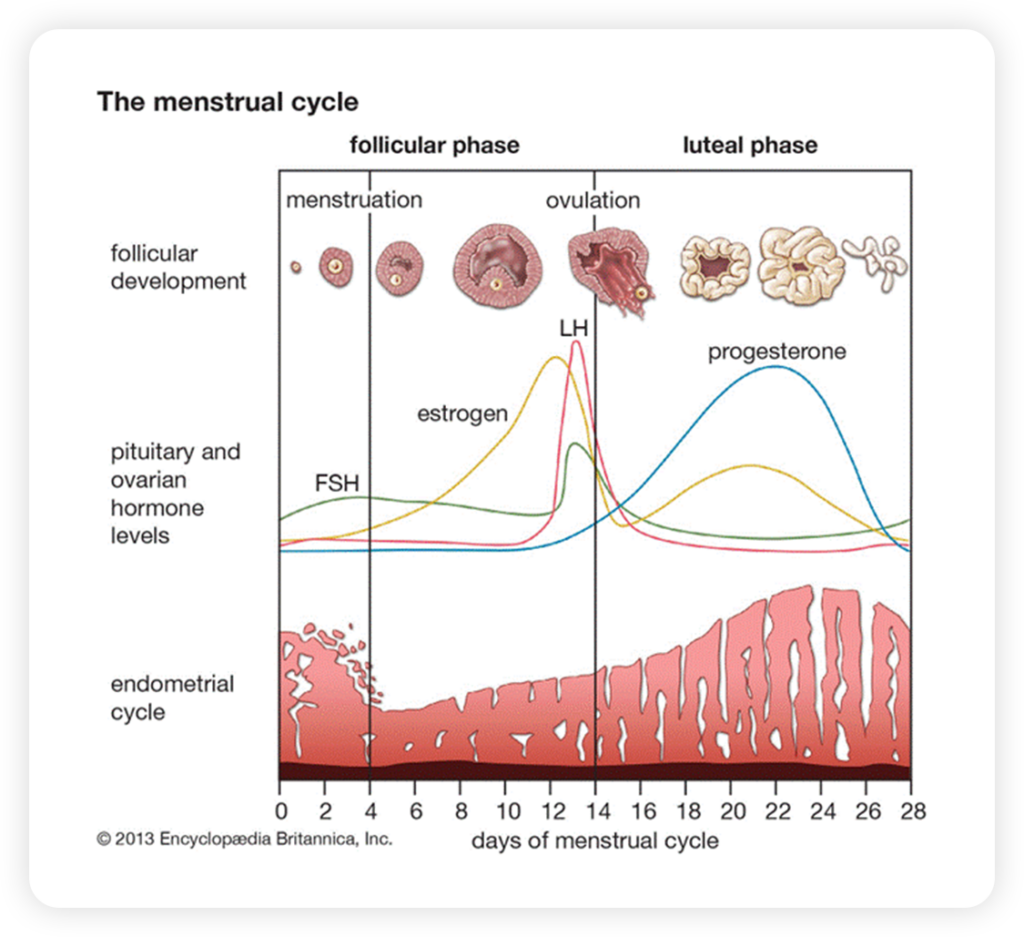Menopause
What is it?
Technically menopause is a pause of menses, meaning menstruation. Menopause commences twelve months after the last period has occurred.
Menstruation begins after puberty and involves hormonal changes that affect egg production, dropping and periods. The usual cycle can be seen in this diagram.
Throughout the menstruation cycle, fluctuating hormone levels can affect:
- Body temperature
- Energy levels
- Clarity of thought
- Mood
Oral contraception overlays oestrogen and progesterone on top of your normal cycle, which can reduce the more extreme symptoms and prevent ovulation.

FSH is Follicle Stimulating Hormone; LH is Luteinizing Hormone

When does menopause commence?
While technically, menopause commences twelve months after your last period, there is generally four to seven years prior to this date where periods become erratic and there can be hormone confusion. This is usually referred to as perimenopause.
The hormonal confusion at this time is a result of anovulatory cycles (i.e. irregular release of an egg) and can cause hormonal dysregulation. Symptoms can include irregular bleeding patterns, more painful and/or heavier periods and an increase in the intensity of PMS symptoms.
However, it’s important to note that there are other conditions that can cause these symptoms. It’s always best to talk to a GP to ensure that what you’re experiencing is menopause, and not something more serious.
Perimenopause: symptoms and consequences
Heavier Bleeding
Women often experience much heavier periods during this time. The additional blood loss can lead to iron deficiency, which can cause fatigue. It’s a good idea to have iron levels checked the next time you see your GP.
Libido
Changing hormone levels can reduce interest in sex. For some, sex can be painful due to dryness. It’s worth discussing what solutions may be available with your GP.
Sleep
Changing hormone levels and symptoms such as night sweats can result in reduced hours of sleep. Poor sleep increases stress and reduces cognitive function so it’s important to get as much sleep as you can, even though this is often easier said than done.
Mood Changes
Varying levels of oestrogen and dropping progesterone can affect your mood. You may experience increased anxiety, irritability or teariness. This is because both oestrogen and progesterone have an impact on serotonin and dopamine.
Weight Gain
Both fluctuating oestrogen levels and cortisol associated with life stress can contribute to weight gain, as oestrogen is important in helping us burn calories. This can be compounded by increased alcohol consumption and limited time to exercise.
Main symptoms of menopause
Symptoms include hot flushes, vaginal dryness, brain fog, and weight gain. Most women have only mild symptoms, however, 30% to 40% of women have moderate to severe symptoms that can affect everyday functioning.
Earlier menopause can occur when the ovaries are removed surgically or due to medical treatments like chemotherapy.
If you’ve had a hysterectomy without the removal of your ovaries, it’s likely that menopause symptoms will occur at the age that you would usually have started menopause. A blood test which looks at FSH levels can be helpful to see if menopause has occurred. However, this is not a reliable diagnostic tool for women who have not had a hysterectomy, as FSH varies with a normal cycle.

Patient information
General information
The Menopause Explained: a series of short videos from the British Menopause Society covering different aspects of the menopause:
Hysterectomy and menopause
Useful podcast discussing menopause
Take a few minutes this week to reflect on your current menopause journey with your Personal Reflection Worksheet.